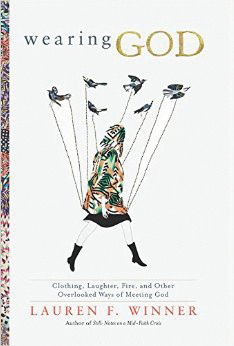 “Sometimes, a hymn gets caught in my hair . . .” When an author serves up a sentence as whimsical and delicious as this on page two, it’s a signal the reader will be rewarded early and often for committing to the whole book. Making a commitment to Wearing God will not disappoint. Be prepared for artful language and for thoughtful, careful ideas wrapped in a bunting and handed over with love. Each section amuses and challenges, entertains and instructs, invites disagreement and then welcomes you back when you’re ready to concede her point. Which you may do quite a lot. Many books are worthwhile. This one could change everything you’ve imagined about God in scripture until now.
“Sometimes, a hymn gets caught in my hair . . .” When an author serves up a sentence as whimsical and delicious as this on page two, it’s a signal the reader will be rewarded early and often for committing to the whole book. Making a commitment to Wearing God will not disappoint. Be prepared for artful language and for thoughtful, careful ideas wrapped in a bunting and handed over with love. Each section amuses and challenges, entertains and instructs, invites disagreement and then welcomes you back when you’re ready to concede her point. Which you may do quite a lot. Many books are worthwhile. This one could change everything you’ve imagined about God in scripture until now.The premise of the work is that “language arranges power.” How we think about God matters as much or more than what we say about God. Maybe we’re not all as tired of shepherd and king and father images for divinity as Lauren Winner is, but we may admit they’ve been exploited to the breaking point of 21st-century imaginations. To use these images exclusively is not merely to limit our understanding of God. It also cheats us of access to so many more curious, revealing, and equally biblically sound facets of the One Who Is.
So maybe our language about God might get a bit clunky if we start to talk about the Holy One without pronouns of any sort. (If you’ve ever tried it for the space of an entire prayer service, you know some sentences will inevitably crash down like cinder blocks.) So what, Winner says. God is such a unique and strange character to us creatures that our language should break down around describing the Infinite.
The more ways we find to speak of God, the closer we come to a truer representation of the deity who expressly forbade making a sure-fast image of one who remains to us, ultimately, a mystery.
This review appeared in the June 2015 issue of U.S. Catholic (Vol. 80, No. 6, page 43).












Add comment